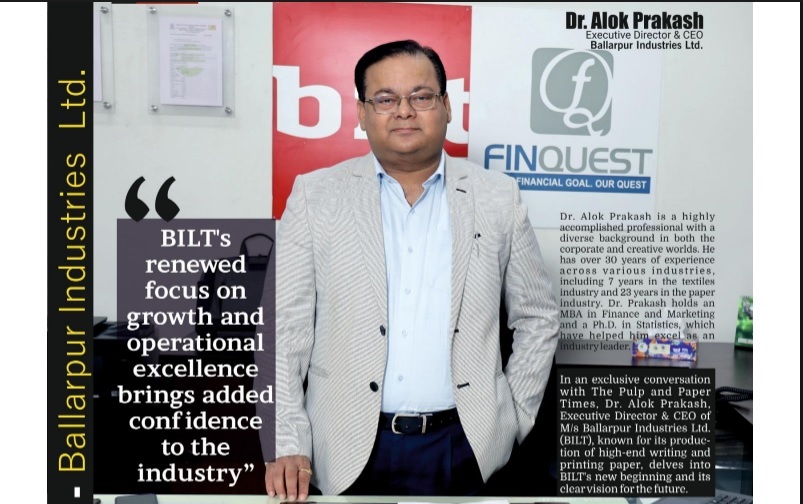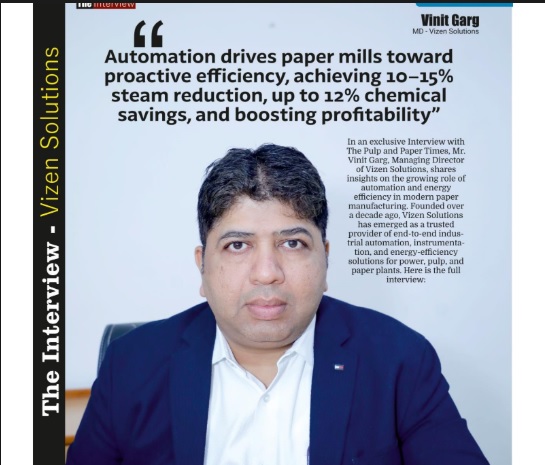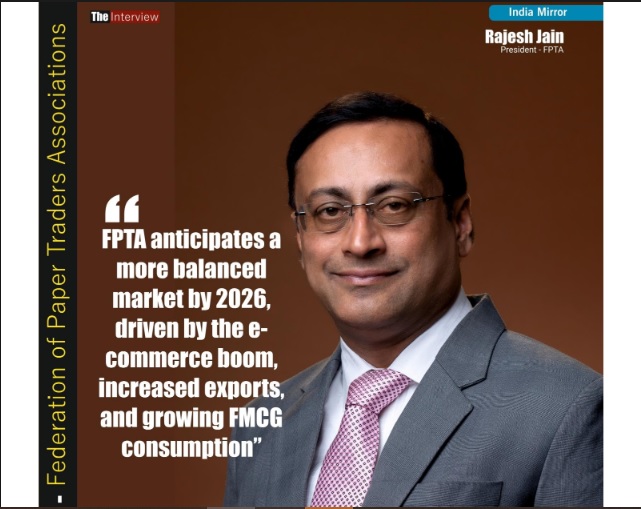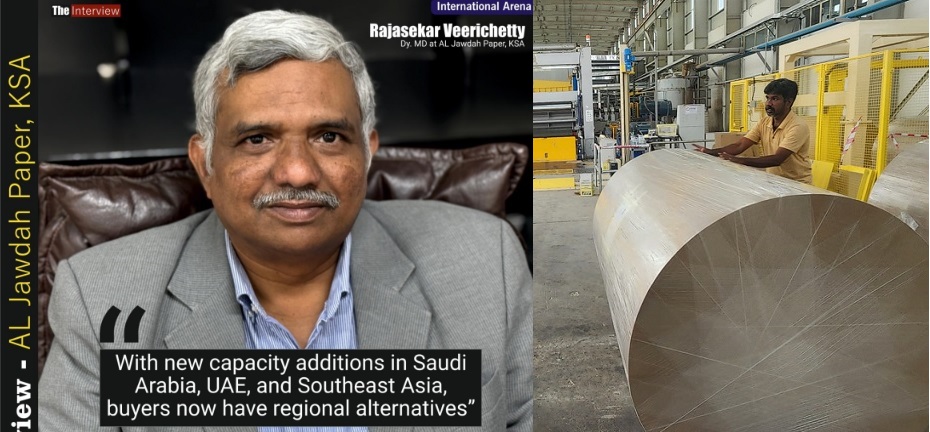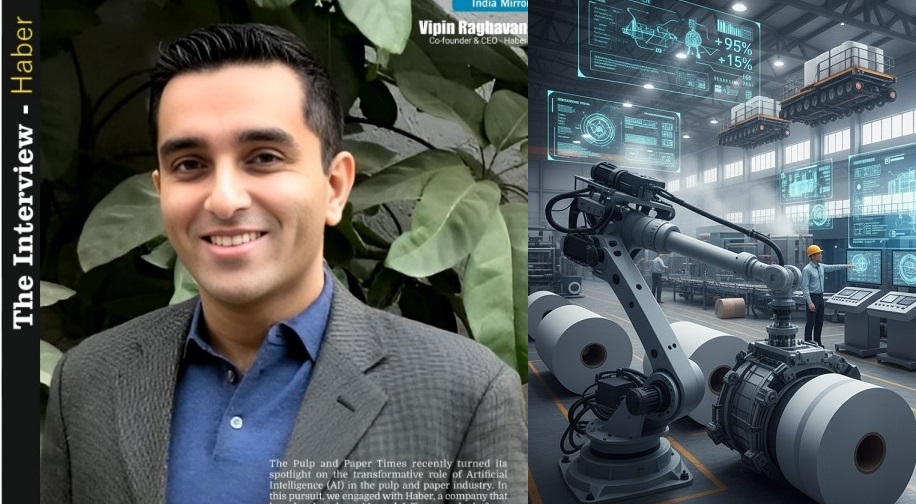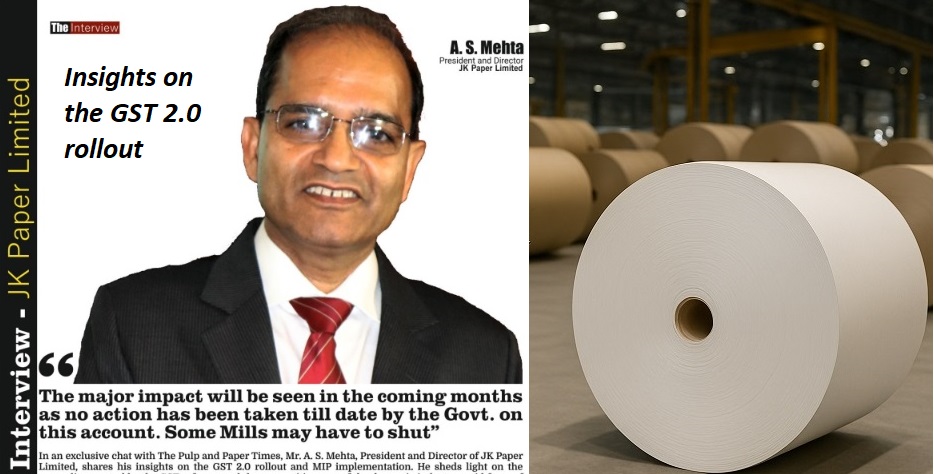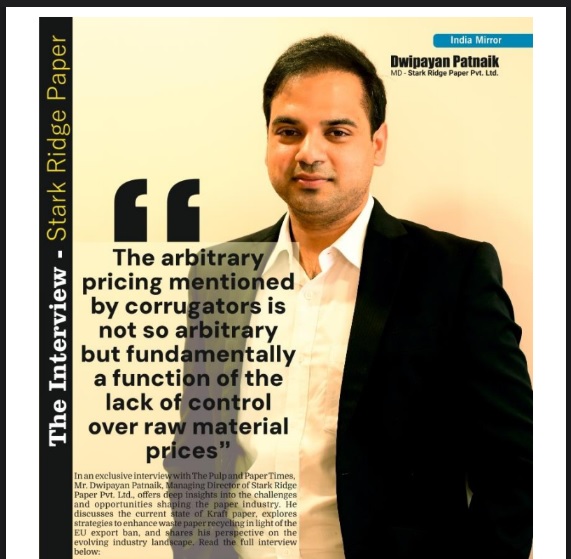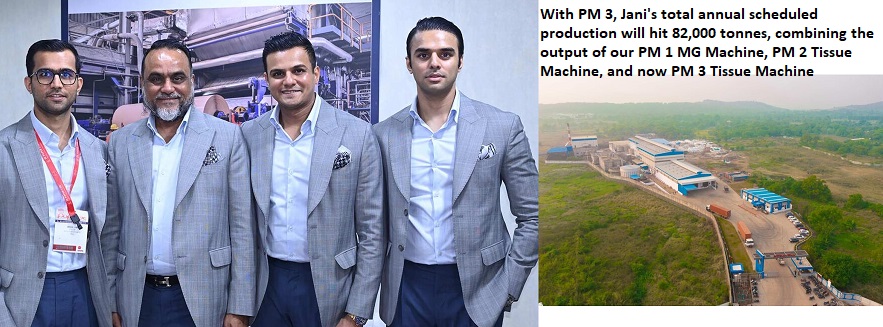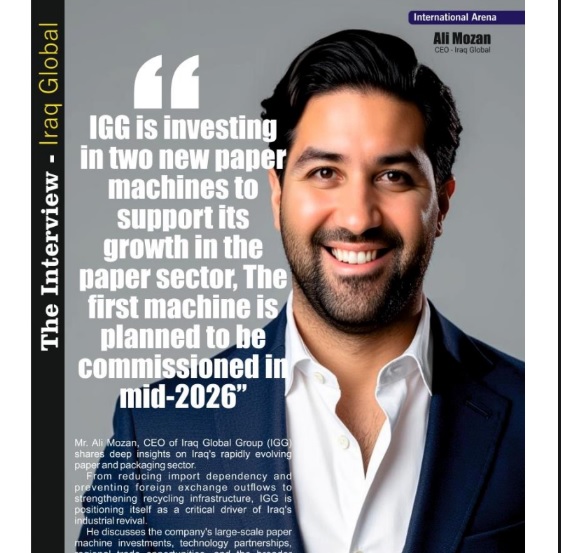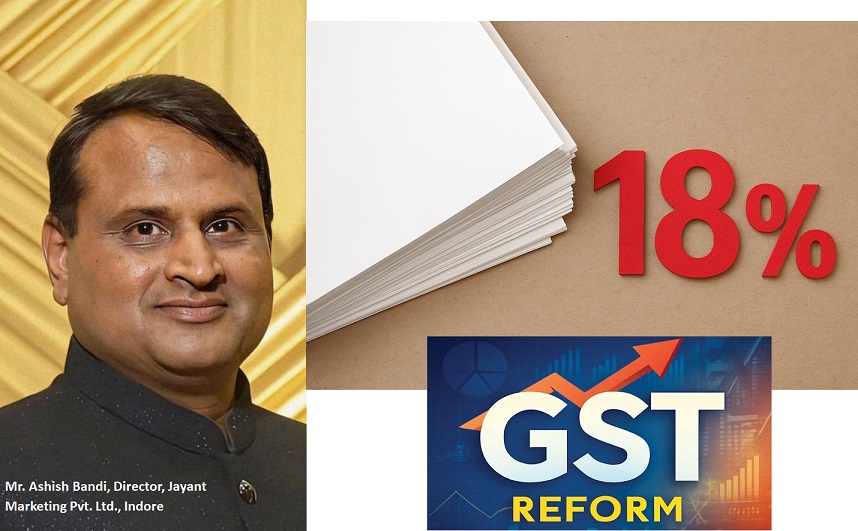Ecosure Pulpmolding Technologies' commitment to advancing sustainable packaging in India is evident through its strong local partnerships and innovative technologies, says Mrs. Kritika Tripathy, Co-Founder and CEO
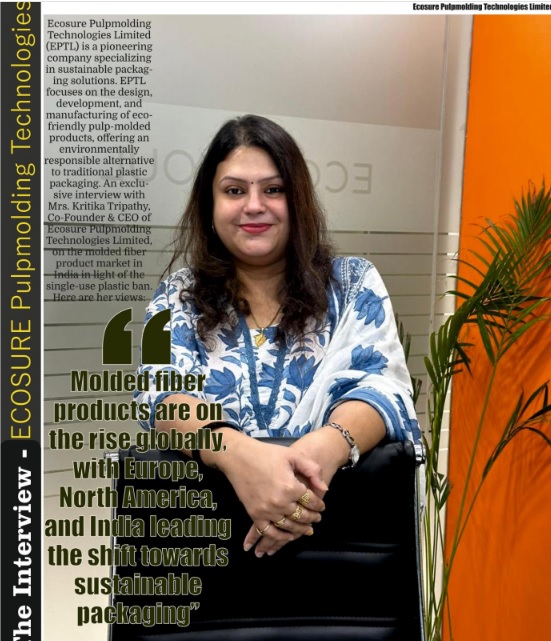
Ecosure Pulpmolding Technologies' commitment to advancing sustainable packaging in India is evident through its strong local partnerships and innovative technologies, says Mrs. Kritika Tripathy, Co-Founder and CEO
“Molded fiber products are on the rise globally, with Europe, North America, and India leading the shift towards sustainable packaging"
“The demand for molded fiber products in India is anticipated to grow at a compound annual growth rate (CAGR) of 20-25% over the next five years.”
“The market for molded fiber products in India is expected to reach USD 500-600 million, up from an estimated USD 150-200 million in 2023”
Ecosure Pulpmolding Technologies Limited (EPTL) is a pioneering company specializing in sustainable packaging solutions. EPTL focuses on the design, development, and manufacturing of eco-friendly pulp-molded products, offering an environmentally responsible alternative to traditional plastic packaging. An exclusive interview with Mrs. Kritika Tripathy, Co-Founder & CEO of Ecosure Pulpmolding Technologies Limited, on the molded fiber product market in India in light of the single-use plastic ban. Here are her views:
The Pulp and Paper Times:
Q: Please give a small introduction of Ecosure Pulpmolding Technologies Limited (EPTL)
Ecosure Pulpmolding Technologies Limited (EPTL) is a pioneering company specializing in sustainable packaging solutions. EPTL focuses on the design, development, and manufacturing of eco-friendly pulp molded products, offering an environmentally responsible alternative to traditional plastic packaging. With a strong commitment to innovation and sustainability, EPTL serves a wide range of industries by providing highquality, biodegradable, and compostable products that align with global environmental standards. The company’s expertise in Pulp Molding technology positions it as a leader in the movement towards greener and more sustainable packaging solutions.
Q: What is Molded Fiber Technology? Why are Molded Fiber Products considered as the future disposable tableware?
Molded Fiber Technology is a manufacturing process that involves converting natural fibers, typically derived from Agro waste, or other cellulose-based materials, into molded shapes and products. This technology is commonly used to produce eco-friendly packaging, trays, containers, and various disposable tableware items. The process typically involves pulping the raw fibers, forming them into a desired shape using molds, and then drying and finishing the products. The result is a durable, biodegradable, and compostable product that can be used as an alternative to plastic or Styrofoam.
Overall, molded fiber products represent the future of disposable tableware as they address the environmental concerns associated with traditional materials while meeting the practical needs of consumers and businesses alike.
Q: As the Indian government banned single-use plastic last year what demand for these fiber molded products do you forecast in the next 5 years? What is the growth rate, and what factors are working behind this growth?
The Indian government's ban on single-use plastics has created a significant demand shift toward sustainable alternatives, including molded fiber products. Over the next five years, this demand is expected to grow substantially as businesses, consumers, and industries adapt to the regulatory changes and increasing environmental awareness.
The demand for molded fiber products in India is anticipated to grow at a compound annual growth rate (CAGR) of 20-25% over the next five years. This growth is driven by regulatory support, consumer demand for sustainable products, and the need for environmentally friendly packaging solutions across various sectors. By 2028, the market for molded fiber products in India is expected to reach USD 500-600 million, up from an estimated USD 150-200 million in 2023. This increase reflects the accelerated adoption of these products in food service, retail, and packaging industries.
Q: As EPTL is a growing name on Indian Soil, how does EPTL cater to the requirement of molded products? What services, machinery, and after-sale support does EPTL provide to its customers?
Ecosure Pulpmolding Technologies Limited (EPTL) is rapidly establishing itself as a key player in the Indian market for molded fiber products. EPTL caters to the growing demand for sustainable packaging solutions by offering a comprehensive range of services, state-of-the-art machinery, and robust after-sales support to its customers.
Offering Customizable Product Solutions, Advanced Machinery, Turnkey Solutions, Consultation and Design Services, After-Sales Support, Training and Installation for 100% satisfaction.
Q: What is the shelf life of the fiber molded box and how does it protect inside food products? Does it require any barrier coating?
The shelf life of fiber molded boxes can vary depending on storage conditions and the specific materials used in their production. Generally, fiber molded boxes have a shelf life of 6 to 12 months when stored in a cool, dry environment away from direct sunlight and moisture. Proper storage conditions are crucial to maintaining the integrity and performance of the boxes.
Q: Every brand in the world has a plastic reduction commitment but change has been slow due to a lack of competitively priced alternative solutions available at scale. As EPTL is a global name, how much of the world is aggressive and aware to adopt these molded products, and where does India stand?
Globally, the adoption of molded fiber products is gaining traction, with Europe and North America leading the way due to strong regulatory frameworks and consumer demand. The Asia-Pacific region shows diverse adoption rates, with significant potential for growth. India, with its aggressive regulatory push and growing market, is quickly emerging as a key player in this movement.
While the global shift away from plastics has been slow due to cost and scalability challenges, the increasing demand for sustainable packaging, driven by both regulations and consumer preferences, is positioning molded fiber products as a key solution. As EPTL continues to expand its reach and innovate in this space, it is well-positioned to contribute to and capitalize on this global trend towards sustainability.
Q: How many types of fibers can be used in the making of molded products? As molded products are made from Agro Residual like straw or Bagasse, Some Paper Mills in India are making Writing and Printing paper from Agro waste also, and they are successfully selling paper at good price. How do you see the future picture of Agro fiber availability, when the penetration of molded products will increase? Which business do you think is more profitable and sustainable in the long term?
Molded fiber products are made from a variety of fibers, each offering different properties and benefits following Agro wastes can be used: Bagasse Fiber, Straw Fiber, Coir Fiber, Wood Pulp Fiber, Hemp Fiber.
Q: Why is this technology considered as a sustainable molded product technology? If we compare a rigid plastic molded product versus a Fiber Molded Product (nonplastic) then what will be the Unique Selling Points (USP) of a Fiber Molded Product over a rigid plastic molded product? Also if we compare the whole picture of science and technology used behind both the products (rigid plastic and molded fiber), which one has less impact on the environment and why?
Fiber molded products are considered sustainable for several reasons like, Renewable Materials, Biodegradability, Lower Carbon Footprint & Reduced Plastic Pollution.
Q: Please share your journey on Indian Soil. Please describe EPTL’s technology partner and its competition in the market. Is EPTL open for further association with any Indian company? If yes. What services and products will you offer to the new joint venture?
EPTL’s journey in India reflects a commitment to providing advanced, sustainable packaging solutions. The company has successfully established a presence in key sectors, leveraging local partnerships and innovative technologies. While facing competition from both international and domestic players, EPTL is well-positioned for growth. The company is open to further associations with Indian firms and is prepared to offer a range of services and products, including advanced technology, product development, consultation, training, after-sales support, and sustainability consulting, to drive mutual success and expansion in the sustainable packaging market.
Q: What is the Life Cycle Analysis (LCA) of molded fiber products, how can we make them more recyclable? How can used molded fiber tableware products be collected by street vendors, or is there any mechanism being promoted by Indian tableware manufacturers to conserve and reuse the valuable Agro fiber in the production of molded pulp products like paper?
Life Cycle Analysis (LCA) of molded fiber products shows a generally lower environmental impact compared to plastics, thanks to their renewable materials and composability. To enhance recyclability, focus on design for recycling, improving infrastructure, promoting composting, and educating consumers.
Collection and reuse mechanisms in India involve leveraging street vendors, developing manufacturer take-back programs, partnering with waste management companies, and exploring the reuse of Agro fibers in paper production. These strategies contribute to a more sustainable lifecycle for molded fiber products, aligning with broader goals of waste reduction and resource conservation.
Q: How do you take this claim that tableware made of bamboo fiber blended with melamine-formaldehyde resin (MF) has been repeatedly found to have excessive migration of melamine or formaldehyde may also have certain safety risks?
The safety risks associated with tableware made from bamboo fiber blended with melamine-formaldehyde resin (MF) are related to the potential migration of melamine and formaldehyde into food. These chemicals can pose health risks if consumed in significant quantities. Ensuring product safety involves adherence to regulatory standards, rigorous quality control, and using improved formulations or alternative materials to mitigate migration risks. Regular testing and clear consumer guidelines also play crucial roles in maintaining safety and protecting public health.
Q: Can Fiber Molded Products be used in heavy-weight packaging & storing applications also? If yes, then what are the limitations and how much it will be costeffective from the traditional heavy-duty kraft paper boxes?
Fiber molded products can be used in heavy-weight packaging and storing applications, but they have limitations compared to traditional heavy-duty kraft paper boxes. While fiber molded products may offer environmental benefits and potential cost savings in the long term, their initial cost and strength limitations can be challenges. The cost-effectiveness of fiber molded products for heavy-duty applications will depend on factors such as production volume, material sourcing, and design optimization. Advances in technology and material science may enhance their suitability for such applications in the future.
Q: Do you provide any financial assistance through banks to buyers? If yes then what will be the cost of business, minimum manpower engagement, and raw material availability if we select a kind of business and Return of Investment (ROI) you assure to the buyers?
As a company involved in the production of fiber molded products, Ecosure Pulpmolding Technologies Limited (EPTL) does not typically provide direct financial assistance or loans through banks to buyers. However, we can offer guidance in setting up a business using our technology and products. Here’s a breakdown of key considerations if a buyer is interested in establishing a business in the fiber molded products sector: Cost of Business, Minimum Manpower Engagement, Raw Material Availability, Return on Investment (ROI).
Web Title: Ecosure Pulpmolding Technologies' commitment to advancing sustainable packaging in India is evident through its strong local partnerships and innovative technologies, says Mrs. Kritika Tripathy, Co-Founder and CEO




 Join WhatsApp Group
Join WhatsApp Group Join Telegram Channel
Join Telegram Channel Join YouTube Channel
Join YouTube Channel Join Job Channel (View | Submit Jobs)
Join Job Channel (View | Submit Jobs) Join Buy Sell Channel (Free to Submit)
Join Buy Sell Channel (Free to Submit) Paper News Headlines Channel (Free to read)
Paper News Headlines Channel (Free to read)



